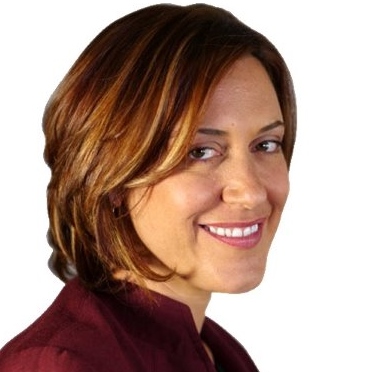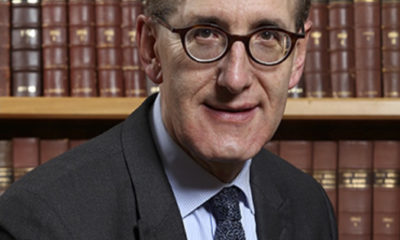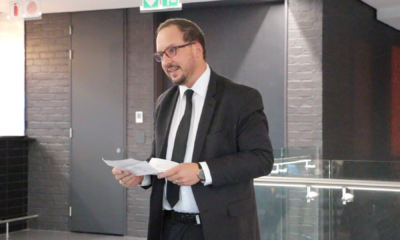
Israel

Use your heart and head to make sense of the conflict
I write this with an overwhelming sense of sadness. The past two weeks have been difficult for everyone. Quite a few people have messaged me in private saying that for the first time in their lives, they are feeling unsafe living as Jews in South Africa.
For me, it has been very difficult to witness the terrible pictures coming out of Gaza. My colleague who lives there spent one night outside in the street after his neighbour’s apartment building was destroyed in an Israeli airstrike. I was brought to tears when he interviewed a teenager who was the first to find the bodies of his father, younger brother, and cousin. The youngster broke down while talking about the last time his father hugged him and told him to be brave. His pain was as raw as it gets.
It reminded me of a previous conflict when I was reporting from inside Gaza, and I interviewed a 15-year-old girl who’d lost her leg, also to an Israeli airstrike. “Nobody will marry me now,” she sobbed, “the only man who will take me will be an old man to be his second wife.”
To be human is to be moved by these stories, but not to let them cloud our understanding of what’s going on, and certainly not to make sense of them by being engulfed with hatred and loathing for the other side.
Because for every Gaza story, I have an Israeli one to match. Like the five-year-old boy whose brother was serving in the army and who would stay up late every night drawing pictures for him so he wouldn’t feel alone on the border.
Or the 90-year-old woman who was watching TV in her living room two weeks ago when a rocket exploded in her home. She lost both legs and is on life support in an Israeli hospital as I write this.
And what about the injured soldiers whose lives are forever changed and who no-one writes about?
Ziv Shilon is a 33-year-old former Israeli commander who lost his left arm and has only 10% movement in his right one after an improvised explosive device almost killed him in Gaza in 2012. He was unconscious for four days.
I meet him in the garden of his Herzliya home. He mentions mornings that the PTSD (post-traumatic stress disorder) gets so bad, he can’t get out of bed. But this isn’t what he wants to talk about.
“If losing part of my body and soul is the path I must travel for serving my country, then that is my journey,” he smiles.
Shilon is as close as I’ve ever got to meeting a modern-day hero. Shrapnel that would’ve blinded him missed his cornea by a millicentimetre. Doctors were convinced he wouldn’t pull through. But he did, and doesn’t feel bitter at all. Instead, he talks about how he and his soldiers risked their lives to prevent civilian casualties in Gaza.
“I’m proud to have served my country in Gaza, and would do it again,” he repeats several times during our interview.
My point is: both sides have pain and suffering. There are lives in Israel and Gaza that have forever been affected by the cycles of violence between the sides. One person’s death reverberates through dozens of changed lives.
My second point is: you can’t compare pain and suffering – and we mustn’t try. But neither must we be taken in by the barrage of anti-Israel sentiment and lack of reporting in mainstream media reflecting the Israeli position. Israel Defense Forces (IDF) soldiers are made out to be villains committing war crimes on helpless Gaza civilians. It can leave supporters of Israel feeling lost and confused.
I remember the first war I covered. It was 2006, the Second Lebanon War between Israel and Hezbollah. It was midnight, and I was at the Metula fence on the Israel-Lebanon border. In those days, we were allowed to talk to the soldiers just before they crossed over into enemy territory. I remember the fear in their eyes and one soldier asking me to pray for him.
I also remember a group of women soldiers linking arms to form a barrier a year earlier in one of the Jewish settlements in Gaza that was being evacuated. Abuse was hurled at them by young teenagers who were being dragged from their homes. One brown-eyed soldier was crying, the tears flowing down her cheeks without a free hand to wipe them away.
In Lebanon, there’s a museum that showcases all the remnants Hezbollah fighters have captured off Israeli soldiers – tins of kosher food line the shelves as do pieces of IDF uniforms with blood on them. I remember a pair of blue-rimmed sunglasses.
The Palestinian struggle has become a celebrity cause for people. News anchors to social media influencers and Hollywood stars talk about the Israeli occupation of Palestinian territories. It’s almost fashionable to be pro-Palestinian. This year, United States rights group Human Rights Watch and Israeli rights group B’Tselem (both of whom the Israeli government accuses of bias) announced that Israeli officials were “guilty of the crime of apartheid”, a term that has become far more prevalent than it ever was before.
Pro-Palestinian activists have gone as far as to say that it’s too late for Israeli officials or tech companies to turn the tide on social media. Israel and Zionism are losing the public-relations war, they declare.
But to the mom whose husband was lost at sea during the Yom Kippur War, it’s not about PR. I never thought someone could die of a broken heart until I heard her son’s story. He was just 12 years old, and was so traumatised by images of his dad drowning that a year later, he simply gave up living. After trying everything to help him, his mother said she came to understand that she needed to let him go to join his dad. The boy died.
Last week, I sat down with Leah Goldin, the mother of 23-year-old Hadar who was killed and kidnapped during the last Gaza war. His body is being held by Hamas as a bargaining tool.
“I’m asking as a mother, please help us, please bring Hadar home. We aren’t a bereaved family. We are a captive family, fighting to bring our son home.”
And then she broke down.
“Hadar was engaged to be married. And his fiancé was married two weeks ago to someone else … which makes me very happy because we want our kids to build their lives and show that terror never wins.”
I know that by publishing this piece in the SA Jewish Report I’m by and large preaching to the converted. But the constant barrage of allegations being levelled against the IDF and Israeli government might be leaving some at a loss as to what’s really happening and even doubtful about Israel’s actions. Don’t be taken in by the numbers game – which side has more casualties – and don’t be misled by the one-sided stories of pain and suffering. Listen to your heart – and reason.
- Paula Slier is the Middle East bureau chief of RT, the founder and chief executive of Newshound Media International, and the inaugural winner of the Europcar Woman in Leadership Award of the Absa Jewish Achiever Awards.










